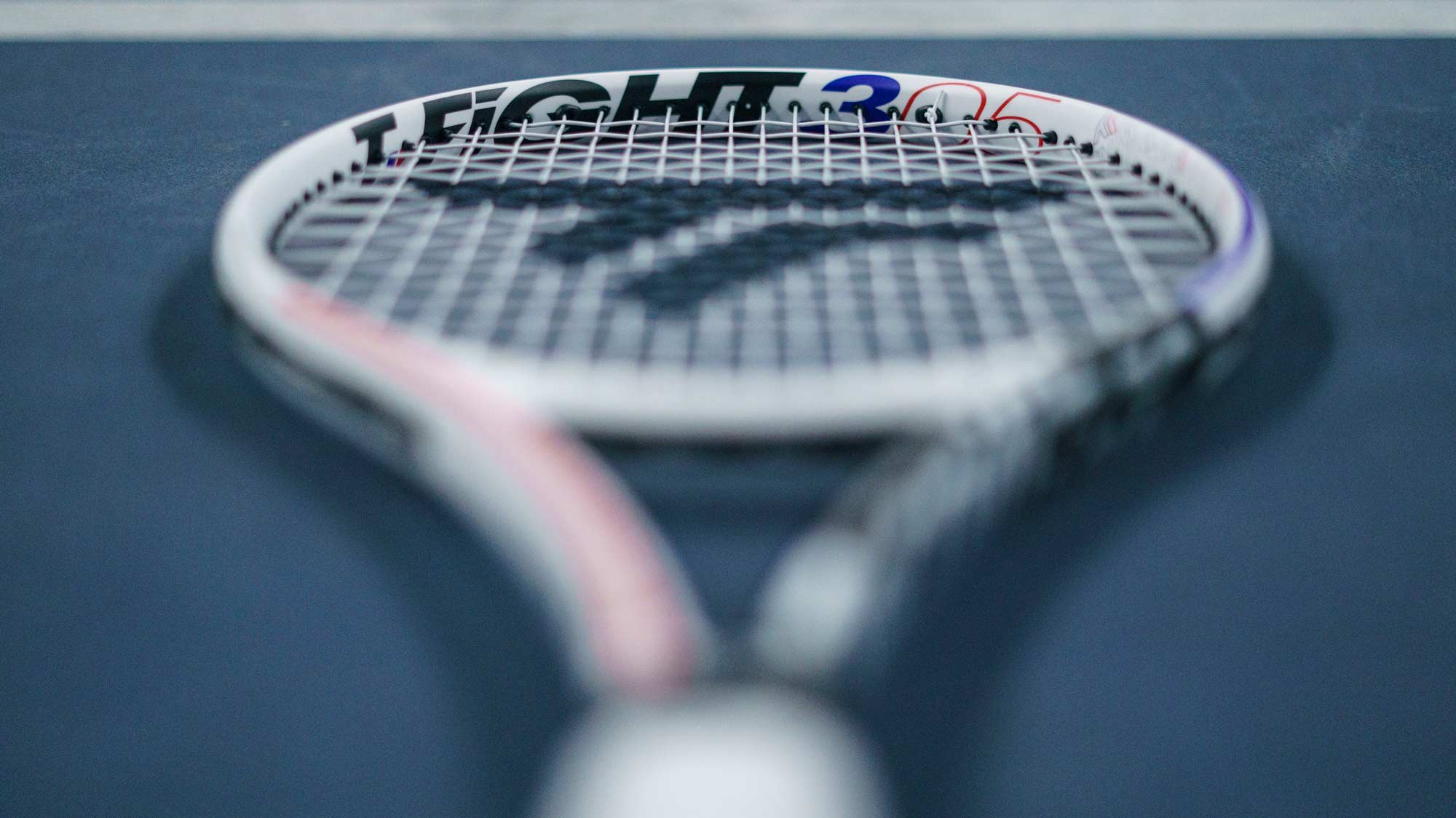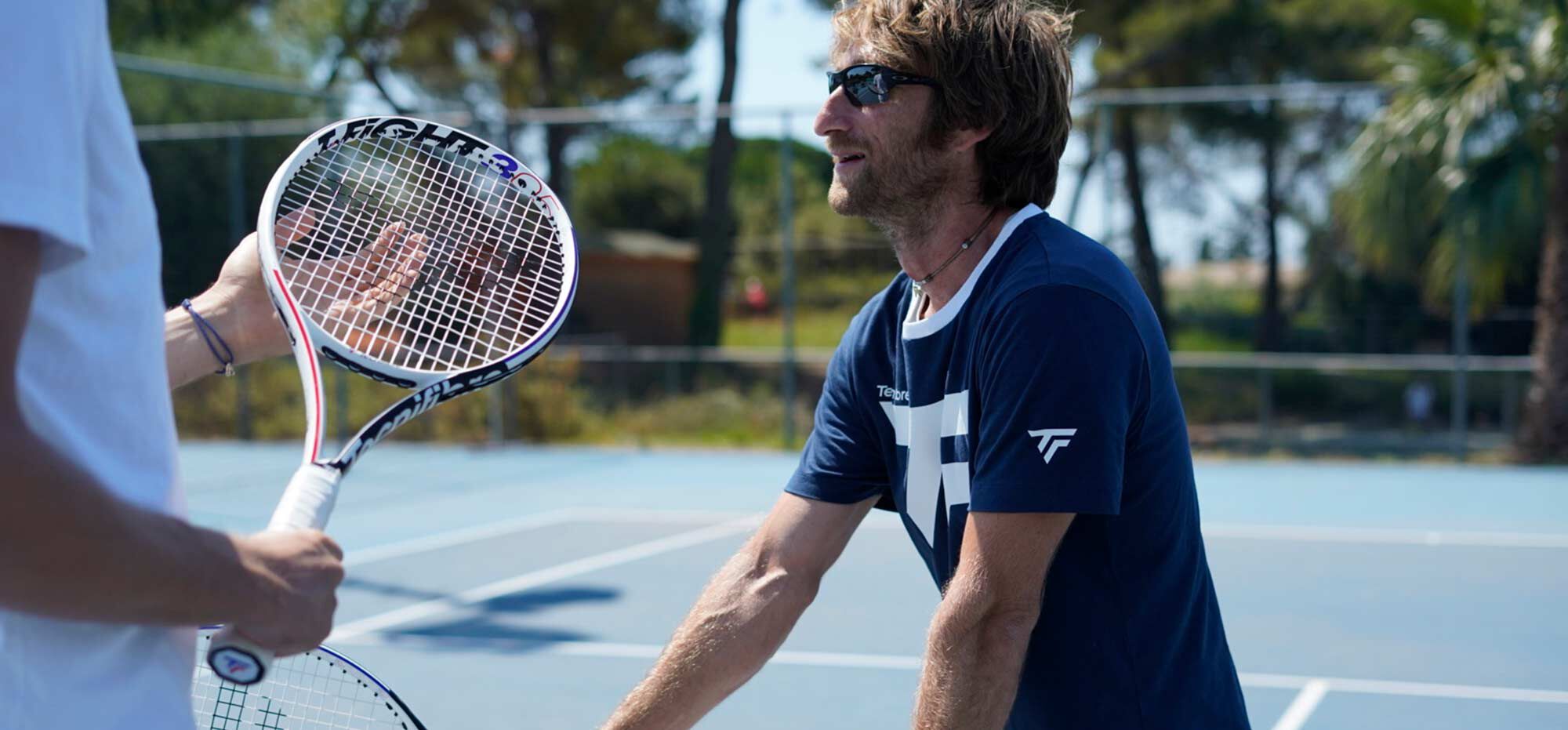GILLES CERVARA: HIS 10 ADVICE TO BECOME A BETTER TENNIS PLAYER!
Have you ever dreamt to get coached as a pro player? Well, we asked Gilles Cervara, Daniil's coach, elected Coach of the Year in 2019 by the ATP, to give you some advice to help you accomplish your Next Shot!
Missing a shot, losing a game, a set, a match. It happens to all of us, and at all levels.
At Tecnifibre, we believe that the most important shot is always the next one. And we are committed to support you to make it!

Here are 10 advice from Gilles Cervara to start the process:
Next Shot #1: get back to competition
In order to successfully get back to competition, I would advise you to recreate in your training sessions the very same conditions you’d face in a competition:
- Organize training sessions with various players, and progressive levels.
- Set time and durations for your training sessions, making it possible to play 2 or 3 sets.
- Have a good warm up before the match.
- Only have a 5-10 minute tennis warm up before starting the match.
- Use the same number of balls on the court as in official matches.
- Bring the same drinks/gear etc… you’d need in an official match.
- Visualize the match mentally before it starts: place, surface, environment, opponent…
Next Shot #2: stop losing it on the slightest unforced error
In order to avoid losing it everytime, I suggest you embrace the unforced error!
Unforced errors are part of the game, and totally inevitable
You must not lose your focus or let the error disturb your emotional balance!
It’s crucial to accept it, to try to understand why it occurred and to mend it. (wrong positioning, wrong zone/shot selection, wrong intention…)
Each player needs to find the right balance between accepting the unforced error and dwelling on it.
You should test yourself in your training sessions to find your own balance.
Next Shot #3: win a tournament
To win a tournament, I suggest to not focus on the long-term achievement (such as win a match), but to concentrate on a much closer one: the next point.
You need to focus on the next point, and then the next one, and the point after, and so on.
Once you’ve won that match, you can start over on the next one, and place your focus on winning points, one after the other.
A tournament can only be won if you maintain the focus on winning point after point.
Daniil and I never think about the sole goal of winning a tournament. We live in the moment, driven by our energy and desire to win.
Next Shot #4: keep fighting even when I’m 6/2 5/1 down
To keep fighting even when far behind, I see three potential solutions to choose from:
Think about a player you admire for their fierceness and use their energy; think about how they handle difficulty and how they find the strength to never give up, and get inspired.
Forget about the score, and focus on the next game as if it was the first in the match.
Live the moment, set new goals, close and reachable to stay motivated: for instance, come back from 5/1 to 5/2, then 5/3 etc….
Focus on the next step to avoid thinking about the long way still to go to win the whole thing, which would be mentally draining.
Next Shot #5: Make (way) less unforced error
In order to significantly reduce the amount of unforced errors, try to identify their cause. Are they due to a lack of technic on a specific shot? A wrong zone/effect? A loss of focus? An emotional overload?
My experience in tennis allows me to see that unforced errors often occur between the 1st and 4th shot on rather simple plays.
So, what you can do is try, during your training sessions, to play a safe game on the first 4 shots.
Once the point is well engaged, your focus will increase and the amount of unforced errors will be reduced!
Next Shot #6: Trust my game in clutch moments
In order to trust your game in clutch moments, first I would advise you to identify which clutch moments you need to work on (break points, game points, end of sets/matchs…), and the type of game you want to play in those moments (aggressive, defensive, specific game plan…)
Then, you’ll need to regularly put that into effect in your training sessions.
Another key-point is self-assessment: after each clutch moment, take some time to evaluate if you succeed in playing the game you wanted or not, and if the result of the match has been impacted.
Next Shot #7: improve my technique on one of my shots
To improve one of your shots, I would advise you to have a talk with your coach.
Once the shot you need to improve and the reason why you need to improve it have been determined, then you can move forward, one step at a time:
- Visualize your current shot and the shot you want to reach (basically your starting and arrival point).
- Apply those changes to your practice sessions, and film your action to see your progress and get you coach's feedback.
- Also work on visualizing your movement to always keep it in mind when you do it.

Next shot #8 : devenir une machine physiquement
Pour (re)devenir une machine physiquement, je recommande de se tourner vers un préparateur physique si tu le peux. Si ce n’est pas possible, garde en tête de bien travailler sur 2 aspects :
- L’aspect musculaire pour éviter les blessures – idéalement 2 sessions par semaine
- L’aspect cardio pour gérer la répétition des efforts et la montée d’intensité – idéalement 2 sessions par semaine également
Il est très important d’être régulier dans le travail sur ces 2 aspects pour ressentir tous les bénéfices du travail accompli.
Next shot #9 : atteindre un nouveau classement
Pour atteindre un nouveau classement, je recommande de te tourner avant tout vers ton entraineur.
Identifie avec lui quel nouveau classement tu veux atteindre, et sers-toi de cet objectif comme une ligne de mire pour booster ta motivation.
Tu peux rendre les choses plus concrètes en listant par exemple toutes les choses qu’il faudrait améliorer pour atteindre ce classement. Tous ces objectifs précis et concrets permettent de garder une motivation stable sur la durée pour atteindre un objectif à plus long terme, comme ce nouveau classement.
Et n’hésite pas à réévaluer les choses si l’objectif final s’avère être trop important ou au contraire trop « simple » !
Next Shot #10 : Arrêter d’accuser ma raquette quand je décentre un coup
Pour arrêter d’accuser ta raquette quand tu rates un coup, je te recommande d’accepter cette faute !
La faute fait partie de ce sport, et elle est totalement inévitable.
Elle ne doit pas être un événement significatif sur laquelle se focaliser et perturber ton état émotionnel.
S’il est donc essentiel de l’accepter, il est tout aussi nécessaire d’en tenir compte pour comprendre ce qui a provoqué cette faute et le corriger (mauvais placement, mauvais choix de zone, de frappe, mauvaise intention…)
Ce juste milieu à trouver entre l’acceptation de la faute et son rejet, est propre à chaque joueur.
Il peut être bénéfique de te tester là-dessus à l’entrainement pour trouver ton équilibre !